Related Research Articles

Johann Ludwig "Lutz" Graf Schwerin von Krosigk was a German senior government official who served as the minister of finance of Germany from 1932 to 1945 and de facto chancellor of Germany during May 1945.
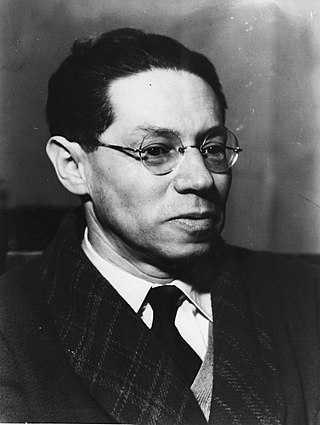
Lion Feuchtwanger was a German Jewish novelist and playwright. A prominent figure in the literary world of Weimar Germany, he influenced contemporaries including playwright Bertolt Brecht.
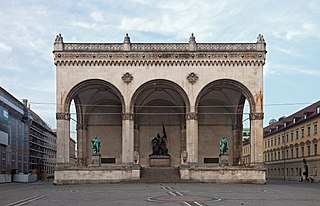
The Feldherrnhalle is a monumental loggia on the Odeonsplatz in Munich, Germany. Modelled after the Loggia dei Lanzi in Florence, it was commissioned in 1841 by King Ludwig I of Bavaria to honour the tradition of the Bavarian Army.

Ernst Franz Sedgwick Hanfstaengl was a German American businessman and close friend of Adolf Hitler. He eventually fell out of favour with Hitler and defected from Nazi Germany to the United States. He later worked for Franklin D. Roosevelt and was once engaged to the author Djuna Barnes.
Feuchtwanger is a German Jewish surname, indicating a family origin from the city of Feuchtwangen, which expelled all its Jewish residents following a pogrom in 1555. Notable people with the surname include:

Ludwig Thoma was a German author, publisher and editor, who gained popularity through his partially exaggerated description of everyday Bavarian life.

Feuchtwangen is a city in Ansbach district in the administrative region of Middle Franconia in Bavaria, Germany with around 12,000 citizens and 137km² of landmass making it the biggest city in the Ansbach district by Population and Landmass. In the year 2019 Feuchtwangen celebrated its 1200th jubilee based on the first mention of its Benedictine monastery.

Infanta María de la Paz of Spain was a Spanish infanta. A daughter of Queen Isabella II, she married her cousin Prince Ludwig Ferdinand of Bavaria. She lived the rest of her life in Germany, dedicating her time to her family, charity work and writing poetry. She wrote a book of memoirs: Through Four Revolutions: 1862–1933.

The Life of Edward II of England, also known as Edward II, is an adaptation by the German modernist playwright Bertolt Brecht of the 16th-century historical tragedy by Marlowe, The Troublesome Reign and Lamentable Death of Edward the Second, King of England, with the Tragical Fall of Proud Mortimer (c.1592). The play is set in England between 1307 and 1326. A prefatory note to the play reads:
The Hitler family comprises the relatives and ancestors of Adolf Hitler, an Austrian-born German politician and the leader of the Nazi Party, who was the dictator of Germany, holding the title Chancellor of Germany from 1933 to 1945, and head of state as Führer und Reichskanzler from 1934 to 1945. Adolf Hitler had a central role in the rise of Nazism in Germany, provoking the start of World War II, and holding ultimate responsibility for the deaths of many millions of people during the Holocaust.
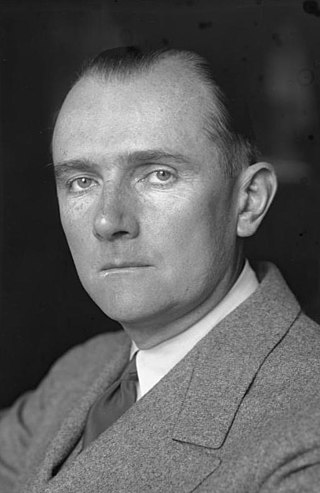
Friedrich Wilhelm von Prittwitz und Gaffron was a German Ambassador to the United States under the Weimar Republic, from 1928 until 14 April 1933. He was in office at the time that Adolf Hitler came to power in Germany, and resigned from the diplomatic corps in protest the day after Hitler was appointed Chancellor. He had hosted German Jewish playwright Lion Feuchtwanger at a dinner that day. On the day of his resignation, Prittwitz called Feuchtwanger and recommended that he not return to Germany. In 1945 he was a founding member of the Christian Social Union in Bavaria, and he served as a member of the Parliament of Bavaria from 1946 to 1954.
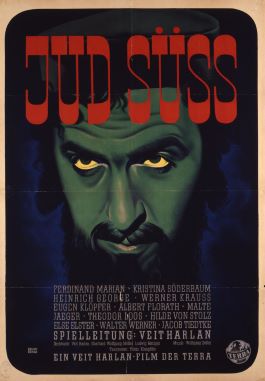
Jud Süß is a 1940 Nazi German historical drama/propaganda film produced by Terra Film at the behest of Joseph Goebbels. Considered one of the most antisemitic films of all time, the film was directed by Veit Harlan, who co-wrote the screenplay with Eberhard Wolfgang Möller and Ludwig Metzger. It stars Ferdinand Marian and Kristina Söderbaum with Werner Krauss and Heinrich George in key supporting roles.
Manfred George, born Manfred Georg Cohn, later shortened to Manfred Georg, was a German journalist, author and translator. He left Germany after the Nazis came to power, living in several different European countries and eventually emigrating penniless to the United States in 1939. He became the editor of Aufbau, a periodical published in German, and transformed it from a small monthly newsletter into an important weekly newspaper, especially during World War II and the postwar era, when it became an important source of information for Jews trying to establish new lives and for Nazi concentration camp survivors to find each other. George remained Editor in Chief of Aufbau until his death.
German Exilliteratur is the name for works of German literature written in the German diaspora by refugee authors who fled from Nazi Germany, Nazi Austria, and the occupied territories between 1933 and 1945. These dissident writers, poets and artists, many of whom were of Jewish ancestry or held anti-Nazi beliefs, fled into exile in 1933 after the Nazi Party came to power in Germany and after Nazi Germany annexed Austria by the Anschluss in 1938, abolished the freedom of press, and started to prosecute authors and ban works.
June Barrows Mussey, who wrote under the pen name Henry Hay, was an American journalist and translator who is notable for his writing about magic and sleight of hand and also of a large number of European authors including Lion Feuchtwanger.

Marta Feuchtwanger was the irrepressible and somewhat eccentric third child of a prosperous Munich businessman who in 1912 married the author Lion Feuchtwanger. Although they married only after Marta became pregnant with Feuchtwanger's child, the marriage lasted forty-six years and she became both a devoted wife and a huge influence on his work. The Jewish couple were forced to emigrate during the Hitler period. After her husband died in 1958 Marta Feuchtwanger spent nearly three decades as a high-profile widow in Los Angeles.
Edgar Joseph Feuchtwanger is a German-British historian.
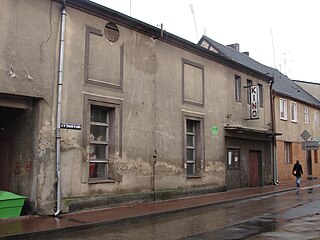
Ludwig Chodziesner was a German criminal defense lawyer and father of German poet Gertrud Kolmar.
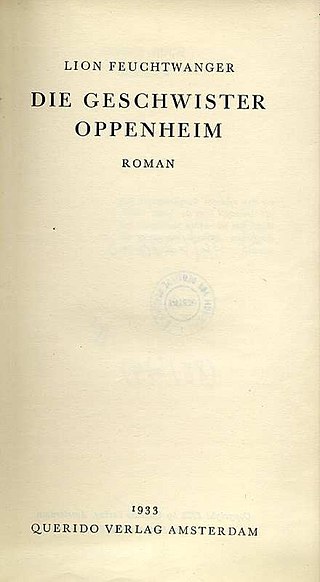
The Oppermanns is a 1933 novel by Lion Feuchtwanger. It is the second novel in his Wartesaal trilogy, which tells about the rise of Nazism in Germany; the first part of the trilogy is Success (1930) and the last is Exil (1940). In the same year when the novel was written, in 1933, the Nazis fully came into power, and the author published the novel already in exile.
References
- ↑ W. von Sternburg, Lion Feuchtwanger, p. 40f
- ↑ R. Jaretzky, Lion Feuchtwanger, p. 9
- ↑ "I Was Hitler's Neighbour | History Today".